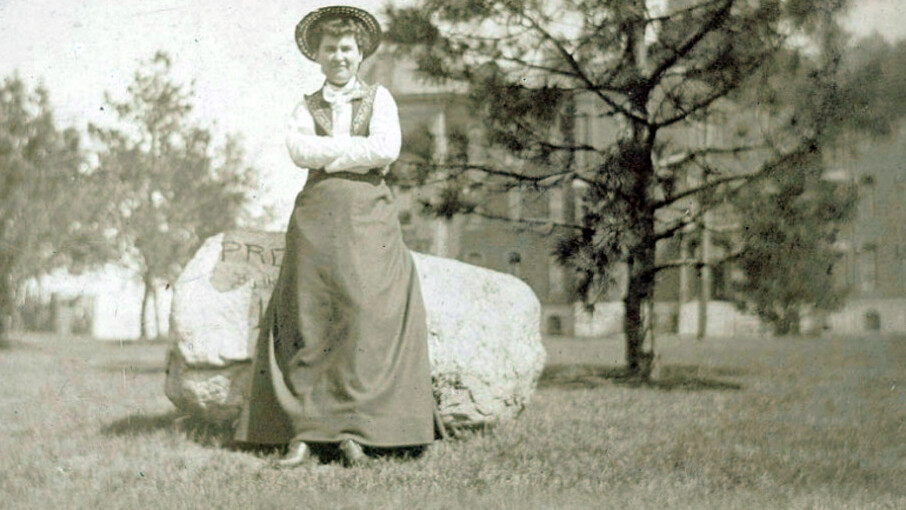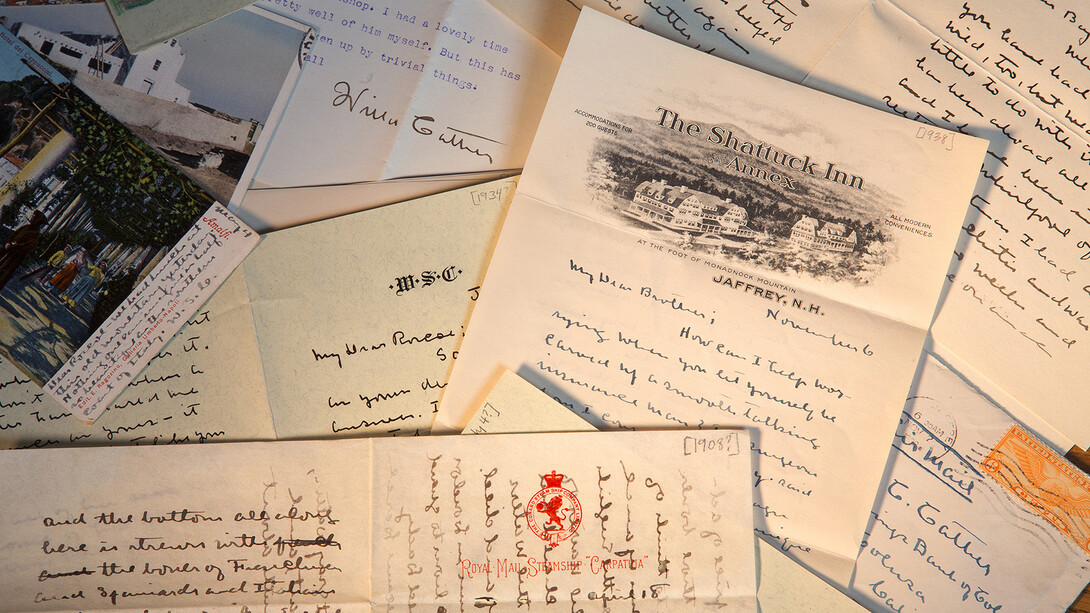
A bronze sculpture of Willa Cather was unveiled June 7 in National Statuary Hall in the United States Capitol in Washington D.C.
The ceremony, which included remarks from Gov. Jim Pillen, Sen. Deb Fischer and others, can be viewed here.
As Cather joins the pantheon of great Americans represented in sculpture, here is a selection of other media featuring the famed author of “My Ántonia,” “O Pioneers,” “Death Comes for the Archbishop” and many other novels, short stories and poems.
“Cather on Campus”
In a 2019 Nebraska Lecture marking the University of Nebraska–Lincoln’s 150th anniversary, Cather scholar Kari Ronning describes life on campus while Cather (Class of 1895) attended the university. In an iconic campus photograph, Cather poses near an engraved stone. That’s the Hartington Rock, a popular spot for amateur photographers armed with the newly invented box camera, Ronning explains. In a twist of fate, Cather embarked on her journalism and literature career after being denied a university teaching job after graduation.
“The Creative Partnership of Willa Cather and Edith Lewis”
English Professor and Cather scholar Melissa Homestead appeared on multiple podcasts and videos to discuss “The Only Wonderful Things: The Creative Partnership of Willa Cather and Edith Lewis” (Oxford University Press, 2021). Homestead’s book shed new light on the life partnership between Cather and Lewis, including Lewis’s influence on Cather’s career. The Cather episode of “The History of Literature” podcast was released in February 2023.
“Our Cather Heritage”
Andrew Jewell, co-editor of “The Selected Letters of Willa Cather,” (Alfred A. Knopf, 2013) and co-director of UNL’s Center for Digital Research in Humanities, delivered a 2018 Nebraska Lecture discussing Cather’s cosmopolitan and transnational view of the Great Plains. A fun fact: the Oxford English Dictionary credits Cather’s “My Ántonia” for introducing the word “kolache” into the English language.
“Prairie Songs: Remembering Ántonia”
Many composers have been inspired to write songs based on Cather’s life and work, the most recent being “Songs of Correspondence,” by composer Richard Stout (son of Janis Stout, co-editor of “The Selected Letters of Willa Cather,”). Previous Cather song cycles include Brent Edstrom’s 2017 “Prairie Songs: Remembering Ántonia,” which premiered in March 2017. Composer Libby Larsen penned a “My Ántonia” song cycle in 2000.
Pulitzer Prize Speech, 1933
Cather was awarded the Pulitzer Prize in 1923 for her World War I novel, “One of Ours.” She was among past winners asked to speak briefly during the 1933 awards ceremony at the Hotel Plaza in New York City. Also speaking during the event was Gen. John J. Pershing, leader of American forces during World War I. He served as head of the University of Nebraska’s military department while Cather was a student and he recalled her during his speech at the Pulitzer event.
“The Complete Letters of Willa Cather” digital archive
Cather became known for two directives about her literary legacy: In her will, she banned publication of her personal letters and, after a lackluster version of “A Lost Lady” starring Barbara Stanwyck in 1934, she refused to permit movie adaptations of her work during her lifetime, a policy continued in her will. Hence, it became national news when the volume “The Selected Letters of Willa Cather” was published in 2013, two years after the ban was lifted. Since then, most of the 3,000-plus surviving letters have been published in a freely accessible digital edition. They include a peppery June 1893 letter from Cather to her college classmate Louise Pound, who became a prominent folklorist, linguist and pioneer in women’s sports.

“Willa Cather: A Matter of Appearance”
Curator Tina Koeppe delivered a January 2011 lecture about a Nebraska History Museum exhibit on Cather’s fashion sense. The exhibit included a teal-colored embroidered wool jacket that Cather wore in some of her most famous portraits, her middy blouse from Abercrombie & Fitch and luxurious furs and evening gowns. The exhibit shows how Cather’s style evolved during her college years.
“Yours, Willa Cather”
Jewell and Homestead contributed to Nebraska Public Media’s 2015 documentary on Cather’s letters. The 30-minute program tells the story of Cather’s life through her correspondence. It includes her response to F. Scott Fitzgerald, answering his worry that his Daisy Buchanan character from “The Great Gatsby” was too similar to her Marian Forrester character in “A Lost Lady.”







